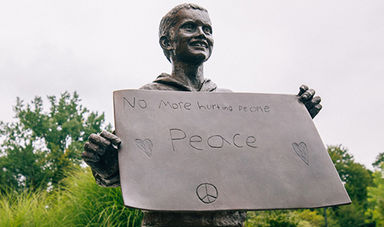
“No more hurting people. Peace.” Those words, famously penned by Martin Richard, are also emblematic of the mission of the institute named in his honor.
The organization prepares new leaders ready to change the world on topics as broad as racial justice, voting rights and sustainability. And they live out Martin’s saying every day serving others as Bridgewater State students.
Named For
Martin Richard
The Backstory

The youngest victim of the Boston Marathon bombings, Martin Richard was watching the race near the finish line with his family (including parents Bill and Denise, both graduates of Bridgewater’s Class of 1993) when bombs exploded in 2013.
After the tragedy, a photo of him holding his sign with the call for peace went viral.
Two years later, at a ceremony attended by hundreds of people including then-Boston Mayor Marty Walsh, BSU formally renamed the institute after Martin. The university also unveiled a statue of him in University Park.
“His spirit is still moving people; it’s inspiring people to be their best,” Walsh said.
In 2022, Bridgewater State unveiled the institute’s new home, a white house with columns acquired and renovated by the BSU Foundation. At a ribbon-cutting ceremony for the home, Martin’s memory remained close at heart.
“This new building dedicated to social justice embodies his message and the commitment our community has toward creating a more just and peaceful society,” said Joanne Tanaka, ’24, who served as a justice fellow.
Use Today
Located on Summer Street next to Woodward Hall, the building includes the institute’s offices and gathering spaces. The organization plans community service activities and spring break service trips, awards grants, and runs the justice fellows program. Fellows are paid student employees who work throughout the academic year with nonprofit organizations and campus-based initiatives to spark social change.
Material in this article comes from the Winter 2015 Bridgewater magazine article “Institute for Social Justice Named for Martin Richard” by John Winters, G’11, and the 2022 article “A Home for Social Justice” by Brian Benson, G’23.